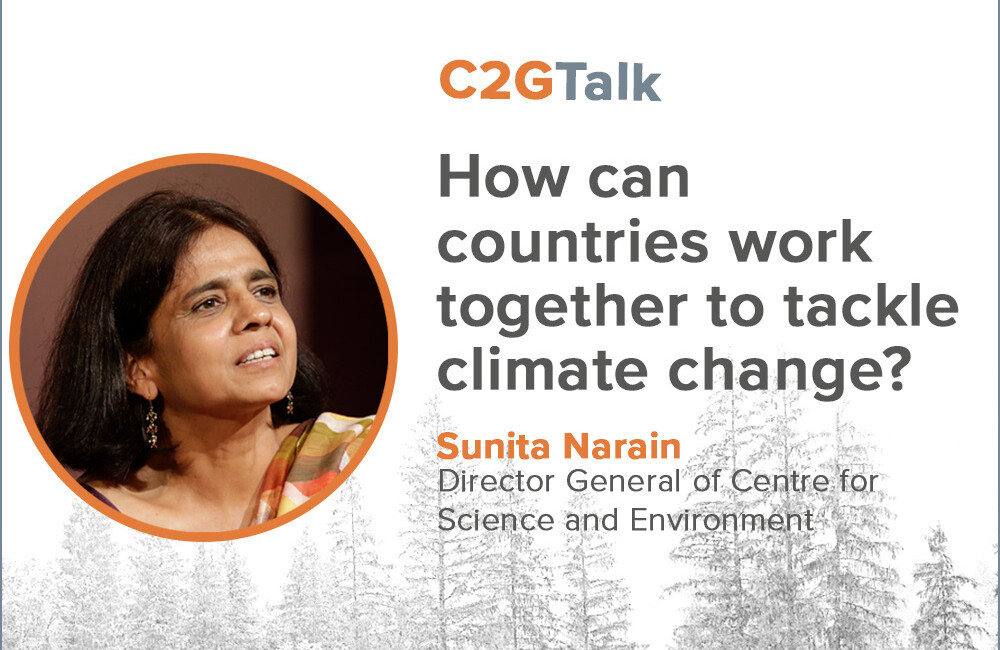Framing ethical perspectives
Climate change refers to human-induced global warming, mostly due to greenhouse gas emissions, and large-scale impacts on weather patterns. As floods, droughts, and other extreme weather events become more common and certain regions turn inhospitable to humans, society is changing as well. Carnegie Council’s events, experts, and Impact Initiatives, such as the Carnegie Climate Governance Initiative (C2G) and the Model International Mobility Convention (MIMC), analyze these changes from a socio-political perspective and search for ethical solutions to, possibly, the most pressing challenges that humanity has ever faced.
Featured Climate Changes Resources
Climate governance, climate-altering technologies, and more
MAR 28, 2024 • Video
Unlocking Cooperation: The Global South and Global North
In the inaugural panel of the "Unlocking Cooperation" series, Ramu Damodaran leads a discussion on forging a path forward for Global South/North collaboration.
JAN 8, 2024 • Podcast
C2GTalk: Why does the world now need to consider solar radiation modification? with Kim Stanley Robinson
Many objections to solar radiation modification have been overtaken by events, says "The Ministry of the Future" author Kim Stanley Robinson in this "C2GTalk."
Explore Our Climate Change Resources

SEP 26, 2022 • Podcast
C2GTalk: How can countries work together to tackle climate change? with Sunita Narain
Countries need to set aside their differences, recognize their interdependence, and negotiate as equals to tackle the climate crisis, says Sunita Narain, the director general ...

SEP 14, 2022 • Podcast
The Doorstep: The Global Water Crisis, with Susanne Schmeier
In two years, two-thirds of the world's population may face water shortages that will lead to crises of epic proportions from water refugees to potential ...

JUN 13, 2022 • Podcast
C2GTalk: How is the UNESCWA supporting Arab states in the green transition? with Rola Dashti
Countries in the Arab region are seeking substitutes to oil so they can diversify their economies and mitigate the impact of fossil fuels production. Rola ...

MAY 31, 2022 • Podcast
C2GTalk: Should the world consider solar radiation modification in light of the latest IPCC findings? with Thelma Krug
More research and better governance is needed to help developing countries make decisions about solar radiation modification (SRM), says Thelma Krug, vice-chair of the Intergovernmental ...

MAY 2, 2022 • Podcast
C2GTalk: How has the governance of solar radiation modification progressed in recent years? with Oliver Morton
The debate around solar radiation modification has broadened in recent years, but there has not yet been significant progress on international mechanisms to govern it, ...

MAR 21, 2022 • Podcast
C2GTalk: How does society view solar radiation modification experiments? with Sheila Jasanoff
It is important to see proposed solar radiation modification experiments in a wider social context, says Sheila Jasanoff, the Pforzheimer Professor of Science and Technology ...

MAR 14, 2022 • Podcast
C2GTalk: Should scientists be allowed to do outdoor research on solar radiation modification? with Ken Caldeira
Over the last two decades, solar radiation modification has gone from an intellectual experiment to something people are seriously considering, says pioneering climate scientist Ken ...

FEB 7, 2022 • Podcast
C2GDiscuss: From Net Zero to Net Negative: Policy Implications for Carbon Dioxide Removal (CDR)
According to the IPCC, large-scale carbon dioxide removal (CDR) is required in all of its pathways to limit global warming to 1.5°C. In this "C2...

JAN 31, 2022 • Podcast
C2GDiscuss: Ocean-Based Climate Altering Approaches in Context: the Ocean-Climate Nexus
The oceans and climate change are inextricably connected. On the one hand, the oceans are faced with significant threats posed by climate change through acidification, ...

JAN 24, 2022 • Podcast
C2GDiscuss: Exploring the role of trees in large-scale carbon dioxide removal
C2G Executive Director Janos Pasztor leads a diverse group of policy, intergovernmental, independent research organization, NGO, and academic experts in a discussion about the ...


